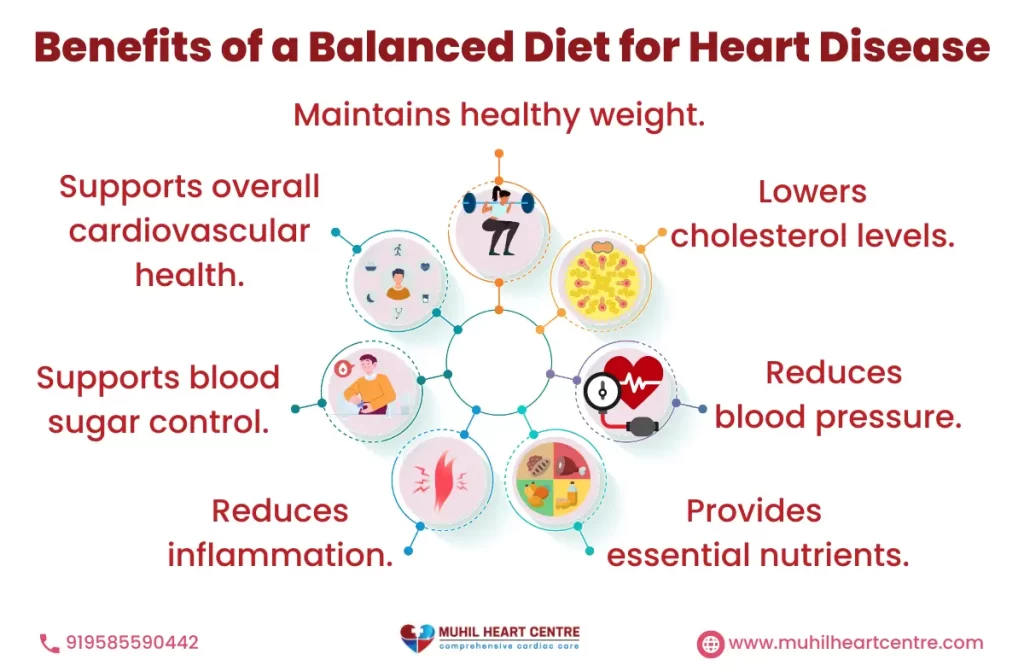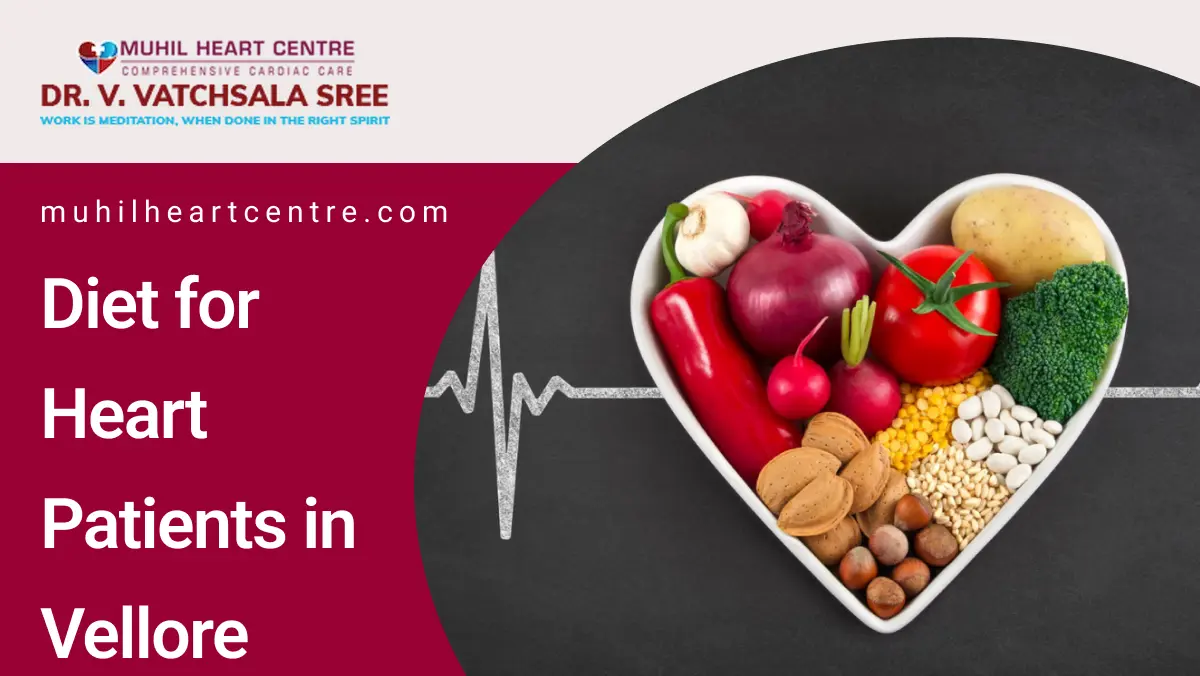Maintaining a healthy heart requires more than just regular exercise and a balanced diet. Adequate intake of essential vitamins and minerals is vital for optimal cardiovascular health. In this blog post, we will explore the role of vitamins and minerals that has to be included in the diet for heart patients in Vellore to prevent heart disease.
Understanding the importance of these nutrients and addressing any deficiencies can help heart disease prevention in Vellore and also reduce the risk of cardiovascular complications.
Vitamin D and Heart Disease
Vitamin D plays a crucial role in cardiovascular health. Deficiency in Vitamin D has been associated with an increased risk of heart disease, high blood pressure, and heart failure. Including Vitamin D in a diet for heart patients in Vellore helps regulate blood pressure, reduce inflammation, and improve overall vascular function.
It also aids in the absorption of calcium, promoting strong and healthy bones. To maintain adequate Vitamin D levels, it is important to spend time outdoors in sunlight, consume Vitamin D-rich foods (such as fatty fish, fortified dairy products, and egg yolks), and consider supplements if necessary as it helps for heart disease prevention in Vellore.

Vitamin B12 and Heart Disease
Vitamin B12 deficiency can have detrimental effects on heart health. The proper functioning of the nervous system and the production of red blood cells heavily rely on the essential nutrient, Vitamin B12. Deficiency in Vitamin B12 can lead to anemia, a condition characterized by a reduced number of red blood cells, which can strain the heart and impair its function.
Furthermore, Vitamin B12 deficiency can contribute to elevated levels of homocysteine, an amino acid associated with an increased risk of heart disease. To ensure sufficient Vitamin B12 as a diet for heart patients in Vellore, animal-based foods (such as meat, fish, eggs, and dairy products) should be included, or consider using supplements if following a plant-based diet.
Iron Deficiency (Anemia) and Heart Disease
Iron deficiency, often manifesting as anemia, can have significant implications for heart health. The production of hemoglobin, a vital protein responsible for transporting oxygen throughout the body, relies on the essential role of iron. Without sufficient iron, the heart has to work harder to pump oxygen-rich blood to the organs and tissues.
Prolonged iron deficiency can lead to anemia, which can cause fatigue, shortness of breath, and increased heart rate. It is important to consume iron-rich foods (such as lean meats, beans, spinach, and fortified cereals) while considering the diet for heart patients in Vellore and, if needed, consider iron supplements under the guidance of a healthcare professional.
Overall Importance of a Balanced Diet
While addressing specific deficiencies is crucial, maintaining a balanced diet is essential for heart disease prevention in Vellore. A diet rich in fruits, vegetables, whole grains, lean proteins, and healthy fats provides a wide range of essential vitamins and minerals necessary for optimal cardiovascular function.
Additionally, reducing the consumption of processed foods, saturated fats, and excessive sodium can further support heart health. It is advisable to consult with a healthcare professional or registered dietitian to develop a personalized heart-healthy diet in Vellore to meet individual nutritional needs.
8 Steps to Prevent Heart Disease
Preventing heart disease involves adopting a heart-healthy lifestyle and making choices that promote cardiovascular health. Here are eight steps you can take to reduce your risk of heart disease:
Eat a Heart-Healthy Diet: Choose a diet rich in fruits, vegetables, whole grains, lean proteins, and healthy fats.
Maintain a Healthy Weight: Achieve and maintain a healthy body weight through a combination of balanced diet and regular physical activity.
Exercise Regularly: Strive for a minimum of 150 minutes of moderate-intensity aerobic exercise or 75 minutes of vigorous-intensity exercise each week to promote heart health.
Quit Smoking: Ceasing smoking is a highly effective measure to enhance heart health, as smoking stands as a significant risk factor for heart disease.
Limit Alcohol Intake: If you choose to consume alcohol, do so in moderation; typically, this equates to up to one drink per day for women and up to two drinks per day for men.
Manage Stress: Practice stress-reducing techniques such as deep breathing, meditation, yoga, or regular exercise.
Control Blood Pressure: Monitor your blood pressure regularly and work with your healthcare provider to manage and control it within a healthy range.
Manage Cholesterol Levels: Keep track of your cholesterol levels and work with your healthcare provider to manage them.
Benefits of a Balanced Diet for Heart Disease
A balanced diet for heart patients in Vellore plays a crucial role in promoting heart health and reducing the risk of heart disease. Firstly, it helps in maintaining a healthy weight, preventing obesity, which is a significant risk factor for heart disease.
Secondly, a balanced diet rich in fruits, vegetables, whole grains, and lean proteins provides essential nutrients like vitamins, minerals, and antioxidants that support cardiovascular health. These nutrients help reduce inflammation, lower blood pressure, and regulate cholesterol levels, thereby decreasing the risk of heart disease.
Moreover, a balanced diet low in saturated and trans fats and sodium helps control cholesterol levels and blood pressure. It also promotes the consumption of healthy fats like omega-3 fatty acids found in fish, nuts, and seeds, which are beneficial for heart health. Lastly, a heart-healthy diet in Vellore helps maintain stable blood sugar levels, reducing the risk of diabetes, another significant contributor to heart disease. Overall, adopting a balanced diet is a powerful strategy to prevent and manage heart disease effectively.
Conclusion
Vitamins and minerals play a vital role when you consider the diet for heart patients in Vellore. Addressing deficiencies in Vitamin D, Vitamin B12, and iron is crucial for optimizing cardiovascular health. Adequate exposure to sunlight, consumption of nutrient-rich foods, and appropriate supplementation can help combat deficiencies and reduce the risk of heart-related complications.
However, it is important to remember that besides following the instructions of the expert at Muhil Heart Centre, a balanced diet should encompass a variety of essential nutrients as it is the foundation of good heart health. By prioritizing nutrition and addressing specific deficiencies, you can maintain a heart-healthy diet in Vellore which can also benefit your overall well-being.
Read also Cardiac Clinics in Vellore.


